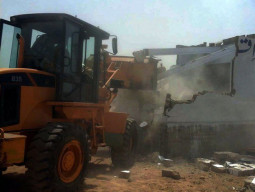
Kashif ushers commuters into the eight-seater Qingqi rickshaws that throng Qayyumabad Chowrangi around 5pm every day. “Nipa, Nipa,” he hollers, signaling the Qingqi’s driver to wait until the two women rushing towards the three-wheeler hop on comfortably.
In the meantime, a Murwat coach arrives and stops by, between the scores of Qingqis waiting for the commuters to board.
A brief altercation ensues between Kashif and the coach conductor. Most commuters alight from the vehicles to witness the action as Kashif and the bus conductor exchange harsh words.

“You are forcing my passengers to take your ride,” the conductor yells at Kashif. The latter denies the allegation, claiming it was up to the passengers to board whichever vehicle suited them. The brawl continues until a traffic police officer intervenes and forces all the Qingqi rickshaws and the coach to leave the site. The scene is a common sight at almost every bus stop in Karachi.

Kashif refers to himself as the munshi of Qingqi rickshaws. His job is to make sure each Qingqi that passes by Qayyumabad Chowrangi is fully loaded with passengers and for this, he charges Rs10 per Qingqi.
Read: Qingqis — a ray of hope
He reasons that for any business to be successful in Karachi, one must cover all the aspects. This is where he comes in. He has to keep the various stakeholders - from traffic police officials to representatives of political parties - happy to ensure there are no obstacles in the Qingqis’ operations around the area. “Around Rs20 is paid to certain traffic police officials by every Qingqi that passes by here,” he says.
The owners’ manual
Jawad, who owns around 80 eight-seater Qingqi rickshaws that run on the S1 and S15 routes, told The Express Tribune he charged Rs800 from every driver per day. This brought his daily revenue to Rs64,000. “What they (the drivers) earn over that amount is theirs to keep,” he said. He has set up several stops on the routes, where his men keep an eye on the Qingqis. “If a traffic police officer tries to fine any of our drivers, we try to protect them,” he admitted. “If our intervention does not work, we take the ticket receipt and pay the fine. The driver doesn’t have to pay the fine from his pocket.”
Rehan, who owns 20 Qingqis that run on the U3 route between Qayyumabad Chowrangi and Dohrajee, seconded Jawad’s claims. “I charge Rs500 from each of my drivers,” he said. “That brings my daily earnings to Rs10,000.” But the money is not enough. Rehan held out a bunch of fine receipts issued by the traffic police and said he had to pay all the fines from his own pocket. “A significant percentage of my day’s earnings goes in paying these fines,” he said, denying the rumours of any arrangements with the traffic police. He did admit, however, that the Qingqi business was backed by political parties in Karachi.
Read: Conventional Pakistani rickshaws get make-over, wifi
Police say no
For traffic police sub-inspector Idrees, who is also the reader to the Traffic DIG, Dr Amir Ahmed Shaikh, no personnel from his department would take a bribe. If they were involved in bribery, the DIG would dismiss them from service on the spot.
“Almost 20 traffic police constables have been dismissed for taking bribes,” he said, adding that Qingqi owners were leveling these allegations due to the strict action against their unregistered vehicles.
Idrees revealed that between January 1 to April 16, 2,554 Qingqis with motorcycles and 2,386 nine to 11-seater rickshaws had been detained. However, the Sindh High Court had given the Qingqi owners a stay order to run their vehicles on the link roads and a final decision regarding their legality was yet to come from the high court.

Another senior traffic police official claimed that the Qingqi business earned a daily profit in excess of Rs50 million - a sum in which all major political parties had a stake. “It all depends on which political party holds sway in the area,” he said. He went on to claim that the munshis were usually unit heads or activists of these political parties, against whom it wasn’t easy for the traffic police to take action.
For his part, the Sindh transport secretary, Tuaha Farooqui, put all the blame on the Punjab government, from where the Qingqis emerged in the first place. “We have written twice to the home department to ban them under Section 144,” he said. “These vehicles are banned in Punjab. Why do they send them to Sindh?”
Published in The Express Tribune, June 29th, 2015.
1719660634-1/BeFunky-collage-nicole-(1)1719660634-1-405x300.webp)

1732276540-0/kim-(10)1732276540-0-165x106.webp)

1732274008-0/Ariana-Grande-and-Kristin-Chenoweth-(1)1732274008-0-165x106.webp)












COMMENTS (2)
Comments are moderated and generally will be posted if they are on-topic and not abusive.
For more information, please see our Comments FAQ